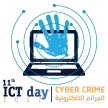Introduction:
The Information and Communication Technology Center (ICTC) at Al-Quds Open University holds its 11th annual ICT Day, entitled “Technology and Cybercrime” on OCT 11, 2017, at Dr. Fathi Arafat Conference Hall at Palestine Red Crescent Society, Jerusalem St. Albireh
The main objective of this event is to reduce the risks of modern technology and work in all ways possible to use technology as a positive service to humanity. Furthermore, the conference will work with competent authorities to come out with a package of recommendations, which supports developing a draft resolution of the Cybercrimes and enhances its implementation in our Palestinian society.
Vision:
Our vision is to stimulate research, cooperation and communication amongst the different ICT sectors, legal professionals and law enforcement, in order to avoid harnessing technology for unethical purposes while ensuring the law of combating electronic crimes through the use of modern technological means, and mobilizing the largest number of experts to come up with recommendations, strategies and plans to contribute to the protection of the Palestinian citizen.
The most important objectives of the 11th ICT Day:
- Introducing local and regional initiatives and proposals related to cybercrimes in order to enrich the Palestinian experience in this field;
- Introducing technological solutions by specialists in the ICT sector to reduce the spread of unethical practices;
- Introducing governmental technological initiatives through competent authorities;
- The role of the official and private institutions in cybercrime issues, the relevant bills and some details that identify the roles and authorities;
- The contribution of public institutions in exercising citizens’ awareness to reduce unethical practices.
Key Topics:
- The misuse of some software and computer applications;
- The Available devices and systems that can be used to reduce the use of programs and applications referred to in the first item;
- How to employ technology to serve and enhance the positive trends in the society and the role of awareness in this field away from unethical practices;
- The role of educational institutions in stimulating the positive use of technology and shedding the light on the risks and negative effects of misusing new technology;
- identify responsibilities and delegations in this field (cybercrimes, information security, experts in the field, the endorsement of rules and regulations and updating them regularly);
- Encourage higher education institutions to include courses in the relevant specializations and colleges;
- Competencies that must be available in case of adopting any of the projects or electronic laws.
The following main topics are proposed for the legislative session, law and the awareness dimension:
- Ethics and cybercrime;
- The role of combating cybercrime in promoting investment;
- Budapest Convention on Cybercrime and the Arabic Agreement on Information Technology;
- Personal freedom and Cybercrime (it is important to have a balance between the personal freedom and security requirements such as the Arabic Convention on Information Technology which was signed by Palestine and which violates this right in several articles);
- Occupation and cybercrime (the fact that the occupation could be a major obstacle in pursuing electronic crimes and solving them);
- Enhancing the skills of the employees, working in combating cybercrime, whether the police or the public prosecution or the judges through specialized training;
- A vision on the possibility of finding mechanisms for the development of electronic systems as quickly as possible in order to cope with the rapid development of technology;
- Focusing on electronic mechanisms and systems (supported by legal tools) protects children and women in the world of cybercrime.
Target Groups:
- Directors of technological and media enterprises / companies operating in public or private sectors;
- Judicial system;
- Law enforcement;
- ICT service providers;
- Academic advisors and researchers working in related sectors (technological, social and legal…);
- Education experts in the field of Communication and Information Technology, Law, Education and Social Science in private and public sector;
- Effective leaders and decision makers at training and research institutions specialized in Technology, Education, and Law;
- Financial sector and banks.
